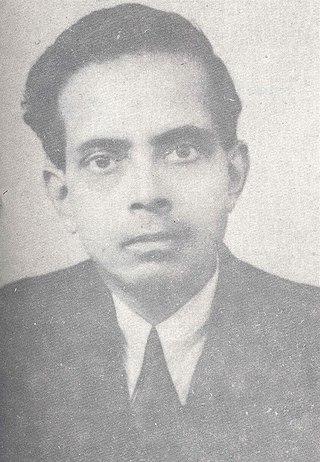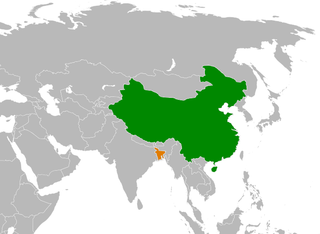Related Research Articles

Bangladesh, officially the People's Republic of Bangladesh, is a country in South Asia. It is the eighth-most populous country in the world and is among the most densely populated countries with a population of nearly 170 million in an area of 148,460 square kilometres (57,320 sq mi). Bangladesh shares land borders with India to the north, west, and east, and Myanmar to the southeast. To the south, it has a coastline along the Bay of Bengal. It is narrowly separated from Bhutan and Nepal by the Siliguri Corridor, and from China by the mountainous Indian state of Sikkim in the north. Dhaka, the capital and largest city, is the nation's political, financial, and cultural centre. Chittagong, the second-largest city, is the busiest port on the Bay of Bengal. The official language of Bangladesh is Bengali.

Dhaka, formerly known as Dacca, is the capital and largest city of Bangladesh. It is the ninth-largest and seventh-most densely populated city in the world. Dhaka is a megacity, and has a population of 10.2 million residents as of 2022, and a population of over 22.4 million residents in Dhaka Metropolitan Area. It is widely considered to be the most densely populated built-up urban area in the world. Dhaka is the most important cultural, economic, and scientific hub of Eastern South Asia, as well as a major Muslim-majority city. Dhaka ranks third in South Asia and 39th in the world in terms of GDP. Lying on the Ganges Delta, it is bounded by the Buriganga, Turag, Dhaleshwari and Shitalakshya rivers. Dhaka is also the largest Bengali-speaking city in the world.

The Bangladesh Armed Forces are the combined military forces of the People's Republic of Bangladesh. It consists of the three uniformed military services: the Bangladesh Army, the Bangladesh Navy and the Bangladesh Air Force. The Armed Forces are under the jurisdiction of Ministry of Defence of the Government of Bangladesh, and is directly administered by the Armed Forces Division of the Prime Minister's Office. The President of Bangladesh serves as the Commander-in-Chief of the Bangladesh Armed Forces. It has the third-largest defence budget in South Asia and according to the Global Firepower index it is the third most powerful military force in South Asia. Border Guard Bangladesh and Bangladesh Coast Guard are under the jurisdiction of the Ministry of Home Affairs during peacetime, but during wartime they fall under the command of Bangladesh Army and Bangladesh Navy respectively.

Sheikh Mujibur Rahman, popularly known by the honorific prefix Bangabandhu was a Bangladeshi politician, revolutionary, statesman, activist and diarist. As a politician, Mujib had held continuous positions as president or prime minister from April 1971 until his assassination in August 1975: as president from 1971 to 1972 and briefly from 1975 until his death, and as prime minister from 1972 to 1975. Mujib successfully led the Bangladeshi independence movement and restored the Bengali sovereignty after over two centuries following the Battle of Plassey in 1757, for which he is honoured as the 'Father of the Nation' in Bangladesh. In 2011, the fifteenth constitutional amendment in Bangladesh referred to Sheikh Mujib as the Father of the Nation who declared independence; these references were enshrined in the fifth, sixth, and seventh schedules of the constitution. His Bengali nationalist ideology, socio-political theories, and political doctrines are sometimes called Mujibism.

The Bangladesh Liberation War, also known as the Bangladesh War of Independence, or simply the Liberation War in Bangladesh, was a revolution and armed conflict sparked by the rise of the Bengali nationalist and self-determination movement in East Pakistan, which resulted in the independence of Bangladesh. The war began when the Pakistani military junta based in West Pakistan—under the orders of Yahya Khan—launched Operation Searchlight against the people of East Pakistan on the night of 25 March 1971, initiating the Bangladesh genocide.

The Bengali language movement was a political movement in former East Bengal advocating the recognition of the Bengali language as a co-lingua franca of the then-Dominion of Pakistan to allow its use in government affairs, the continuation of its use as a medium of education, its use in media, currency and stamps, and to maintain its writing in the Bengali script.

The Bangladesh Army is the land warfare branch and the largest component of the Bangladesh Armed Forces. The primary mission of the Army is to provide necessary forces and capabilities to deliver the Bangladeshi government's security and defence strategies and defending the nation's territorial integrity against external attack. Control of personnel and operations is administered by the Army Headquarters, Dhaka. The Bangladesh Army is also constitutionally obligated to assist the government and its civilian agencies during times of domestic national emergency. This additional role is commonly referred to as "aid to civil administration".
Abu Sadat Mohammad Sayem was a Bangladeshi jurist and statesman. He was first Chief Justice of Bangladesh from 1972 to 1975. He became the president of Bangladesh in the aftermath of counter-coups in November 1975. He was made Chief Martial Law Administrator. Sayem presided over a cabinet headed by the three chiefs of the armed forces. The cabinet included civilian technocrats and politicians. Sayem resigned on grounds of ill health in April 1977, and was replaced by President Ziaur Rahman.
Kamal Hossain is a founding leader, lawyer and politician of Bangladesh. He is known as the "father of the Bangladeshi constitution" and regarded as an icon of secular democracy in the Indian subcontinent. Hossain currently heads his own law firm in Dhaka. He retired from political activities and from the post of president of Gano Forum in October 2023.
The Swadhin Bangla Biplobi Parishad was an armed underground student political group secretly organized in 1961 by Serajul Alam Khan, a key founder of Bangladesh, that worked to wage an armed secessionist struggle against Pakistani rule and achieve the independence of East Pakistan as "Bangladesh".
The Bangladesh Liberation War started on 26 March 1971 and ended on 16 December 1971. Some of the major events of the war are listed in the timeline below.

Shahbagh is a major neighbourhood and a police precinct or thana in Dhaka, the capital and largest city of Bangladesh. It is also a major public transport hub. It is a junction between two contrasting sections of the city—Old Dhaka and New Dhaka—which lie, respectively, to its south and north. Developed in the 17th century during Mughal rule in Bengal, when Old Dhaka was the provincial capital and a centre of the flourishing muslin industry, it came to neglect and decay in early 19th century. In the mid-19th century, the Shahbagh area was developed as New Dhaka became a provincial centre of the British Raj, ending a century of decline brought on by the passing of Mughal rule.

Muhammad Siddiq Khan was the librarian of the Central Library of the University of Dhaka and the founder of the university's Department of Library Science. In March 2004, the Government of Bangladesh posthumously awarded him the Independence Day Award, the country's highest civil honor.

Pakistan and Bangladesh are both South Asian Muslim-majority countries. Following the end of British rule in India, the two countries formed a single state for 24 years. The Bangladesh Liberation War in 1971 resulted in the secession of East Pakistan as the People's Republic of Bangladesh. Pakistan recognized Bangladesh in 1974 after pressure from across the world. Today, bilateral relations between Bangladesh and Pakistan are considered to be cordial.

Bangladesh–China relations are the bilateral relations of Bangladesh and China. Bangladesh has an embassy in Beijing and consulates in Hong Kong and Kunming. China has an embassy in Dhaka. Both countries are members of the BCIM Forum. According to Chinese government designations, Bangladesh and China are in a "strategic partnership of cooperation".

Abul Maal Abdul Muhith was a Bangladeshi economist, writer, civil servant, secretary, diplomat and politician. He served as the finance minister of the government of Bangladesh from January 2009 until January 2019.

Abdul Hamid Khan Bhashani, often shortened as Maulana Bhashani, was a Bengali politician. His political tenure spanned the British colonial India, Pakistan and Bangladesh periods. Maulana Bhashani was popularly known by the honorary title Mozlum Jananeta for his lifelong stance advocating for the poor. He gained nationwide mass popularity among the peasants and helped to build the East Pakistan Peasant Association. Owing to his political leaning to the left, often dubbed Islamic Socialism, he was also called 'The Red Maulana'. He is considered as one of the main pillars of Bangladeshi independence of 1971.

The University of Dhaka is a public research university located in Dhaka, Bangladesh. It was established in 1921 as University of Dacca and it is the oldest active university in Bangladesh.

M Sakhawat Hossain is a Bangladeshi author and speaker. He is a former Election Commissioner of Bangladesh (2007-2012), Brigadier general (retired) in the Bangladesh Army. He wrote more than 32 books, and serves as a columnist and freelance commentator on national and international television as a security and defense analyst.

Genocide Remembrance Day is a national day of remembrance in Bangladesh observed on 25 March in commemoration of the victims of the Bangladesh genocide during the Bangladesh Liberation War in 1971.
References
- ↑ "Akbor president, Anwarul secy general of Library Association of Bangladesh". The Daily Star. 2018-01-03. Retrieved 2018-11-25.
- 1 2 Rahman, Md Zillur. "Library Association of Bangladesh". Banglapedia. Asiatic Society of Bangladesh. Retrieved 25 November 2018.